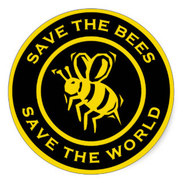 Jes Stiehm Staff Writer After hearing the phrase ‘Save the Bees’ for years, one would expect people would be more inclined to attempt to conserve the tiny insects or at least learn more about their oncoming infliction. However, since the alarming drop in the honeybee population in 2006, public awareness has been minimal. Without a direct threat in the public's face, it is unlikely anyone will immediately care about the drop in honeybee population. So, why should you care about the bees? Frankly, we will severely suffer without bees. Bees, although seemingly small, provide essential services in nature. They pollinate at least a third of the world's crops. Bees are an indicator species, which makes them an essential linchpin in nature's ecosystems. If they go extinct, other species will suffer or perhaps die out altogether. The crops that would be left without bees would become scarce and expensive. Albert Einstein is credited with saying, “If the bee disappeared off the surface of the globe then man would only have four years of life left. No more bees, no more pollination, no more plants, no more animals, no more man.” The quote is not completely accurate but he did grasp the seriousness of the situation. Several factors are attributed to the sudden drop in bee numbers. Neonicotinoids, one of the top reasons for the declining honeybee population, is a systemic insecticide that works in a different way than most other insecticides. Neonicotinoids, when applied, are absorbed into the plant as a sort of poisonous protection. This poison does not hurt the plant, but it is harmful to any insects that come in contact with it. Neonicotinoids are preferred by farmers because of their lasting presence in the plant; it can take months or even years for the chemical to fade. The European Commission has banned the use of it on all bee attracting crops, and several food brand groups are urging the Obama Administration to do the same. Saving the bees cannot be done instantly. It will take a united front and conservation consistency. There are a few key things the average person can do to support the bee movement. Plant a bee garden with nectar producing plants, for instance, or if you find a hive of bees in the attic, don’t call the exterminator. Call a local beekeeper instead, and they will remove the hive safely. If desired, become a beekeeper and enjoy the added benefits of a bountiful garden and fresh honey. Click here for more ways to help save the bees. Comments are closed.
|
Archives
March 2017
Categories
All
|

